When I previewed The Outer Worlds this summer and found that it wasn’t quite clicking, I wondered if it was just because I only had 90 minutes to play when the full game is many times that length. After all, it had some of the elements that I remember best from Fallout: New Vegas (the quirky characters, the mountain of side quests, the vast wasteland to explore, the just-OK combat), but it just wasn’t scratching the same itch. Maybe, I thought, it’s a game that only really feels good when you have the time to see how your moment-to-moment choices ripple out across a longer timespan. Having played the final game, I can say that the section I played earlier just wasn’t a great part of the game and there are plenty of moments that work much better in isolation, even if the full game is less than the sum of its parts.
The Outer Worlds follows a structure familiar to anyone who’s played open-world RPGs like Fallout or The Elder Scrolls. You show up in town, chat with NPCs, recruit companions, and wander through the wilderness completing side quests as you slowly pick away at the main mission. In this case, you find yourself awoken from suspended animation by rogue scientist Phineas Welles after he discovers your ship, Hope, which has been adrift in space for decades. You then make your way to Halcyon, a space colony ruled over by a handful of corporations collectively known as the Board, to help Phineas save the crumbling colony. Obsidian has been very open about The Outer Worlds being smaller in scope than other games in the genre, but it feels oddly too big and too small at the same time. It seems to want to keep all the trappings of typical open-world RPGs without the scale to have them make sense, from its mostly empty landscape to its limited companion quests.
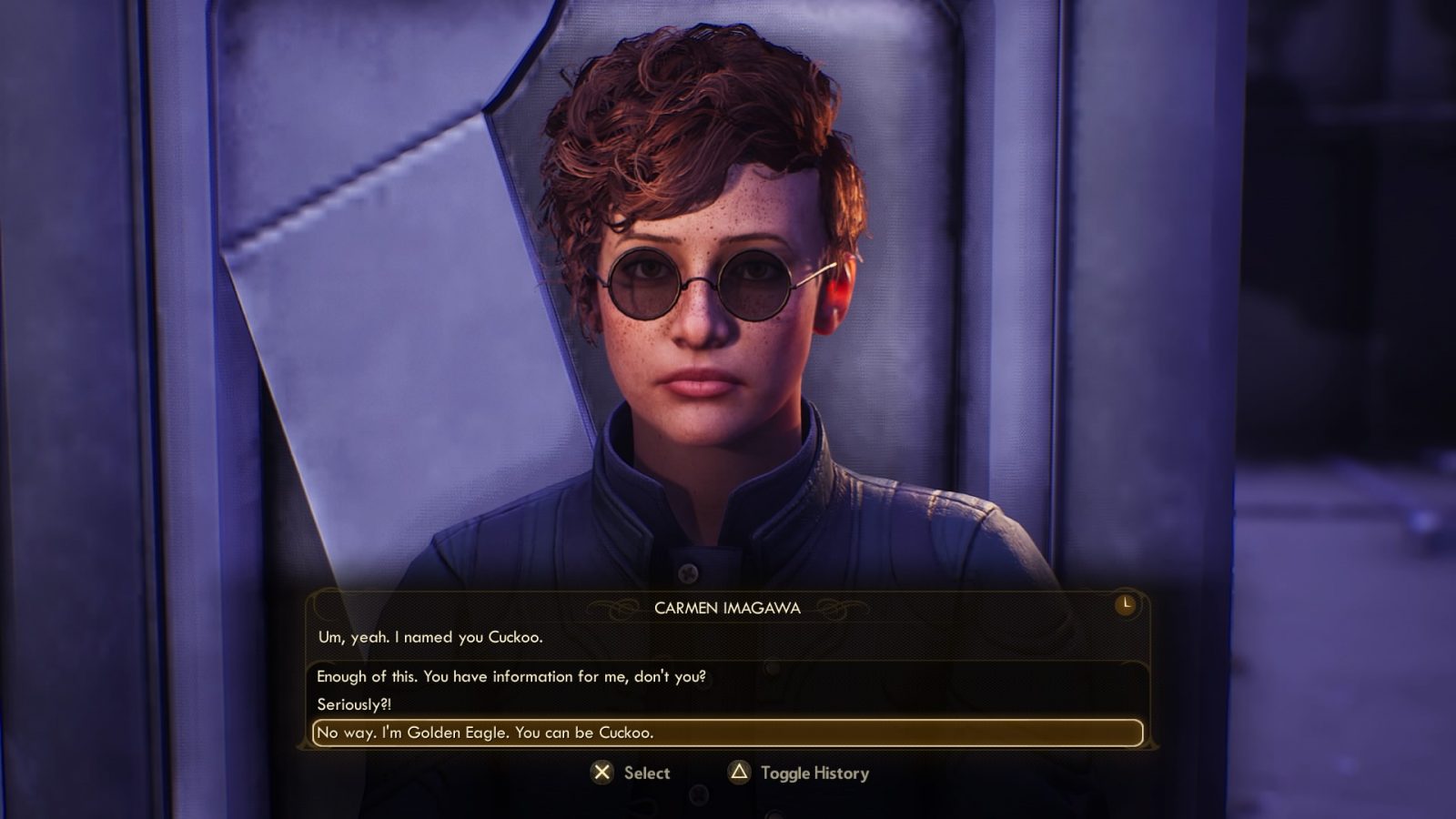
That’s not to say that there’s no fun to be had within its limited structure. The combat in The Outer Worlds is satisfying but not spectacular, and there’s a wide enough range of weapons that you’ll likely be able to find one that suits you well. I ended up sticking with similar loadouts for most of the game, despite constantly tripping over piles of guns, just because fast-firing weapons with elemental effects gave the most satisfying feedback when they hit their target, something that’s severely lacking in most of the game’s conventional weapons. Regardless of your loadout, your companions can absolutely destroy most enemies in the game with minimal assistance, despite their most advanced tactical option being “stand 10 feet from the first thing you see and shotgun it to death.” If you’re looking for any sort of challenge, I’d recommend cranking the difficulty up to Hard, where baddies at least hit a bit harder and take longer to kill.
Combat isn’t the highlight of The Outer Worlds, though. I’d go as far as to say that there’s actually too much combat, given how much more satisfying some of the less action-oriented parts of the game are. The game is full of well-written, funny dialog and has its share of compelling characters among both your allies and enemies. I picked my companions based solely on how much I liked their personality, and the biggest pay-off for most quests came not from the rewards they granted but for the story details and conversations that would happen along the way. While most of its big-picture satire falls completely flat, it’s packed with little one-liners that got some genuine belly laughs out of me.
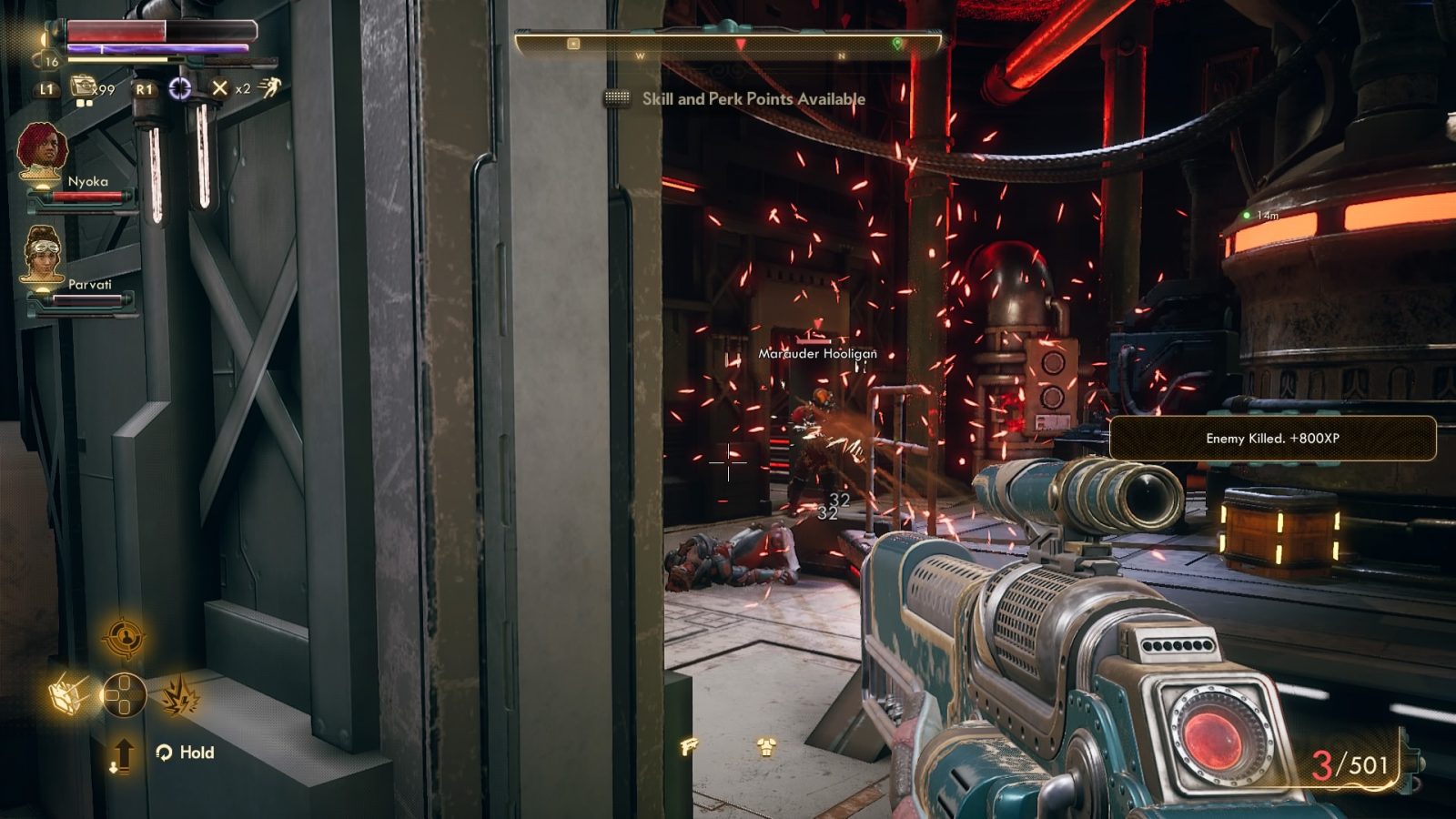
Starting from the first reveal of The Outer Worlds, Obsidian pushed two big selling points: its tongue-in-cheek corporate dystopian setting and the freedom to play however you want. It turns out those are two of the most interesting parts of the game, but they’re interesting for how they fail as much as how they succeed. Trailer after trailer emphasized how you’ll be able to decide not only your own fate in The Outer Worlds, but the fate of the entire Halcyon colony, and it’s true — you can play The Outer Worlds basically any way you want to, but rather than feeling empowering, the result is oddly constraining.
The basic form your nominal freedom takes is the ability to customize your character. From an array of skills that will be familiar to any New Vegas player, you’ll distribute experience points you gain every time you level up. Put points into Hack and you’ll be able to take over mechanical enemies or snoop around in strangers’ emails; dump them into 1-Handed Melee and you can pound those rowdy robots into dust with a hammer and just stick to imagining what kind of raunchy things Halcyon’s inhabitants are writing about in their diaries. The Outer Worlds introduces some interesting twists to this familiar system. Each skill belongs to a group, like Ranged or Tech, and putting one point into any group will increase every skill in it up to level 50, at which point you have to start picking specific skills. It’s a helpful system if you just want to progress from terrible to slightly-less-terrible at ranged combat without having to specialize in a particular type of gun while still having enough points to go deep into the skills you really care about. There’s even a skill that lets you gain points in other skills from your companions, which gives you even more freedom to tweak your skill loadout each time you change your party.

The trouble comes with how you actually use those skills in the game. The Outer Worlds keeps its promise of letting you play however you want by flattening the difference between skill sets and being unwilling to keep any of its content out of reach. While on rare occasions, being an expert hacker or inveterate liar might give you a slightly different way to complete a quest, the end result is almost always the same, and never once did I encounter an obstacle that I had to put off until I could level up or switch crewmates to complete. Most important locked computer terminals can also be opened with a passcode found conveniently nearby, and anything you gain by charming your way through a conversation can also be achieved through violence. Time after time, I used my Lockpick skill to break into an off-limits section of one or another practically identical compound only to find another unlocked door just feet away for anyone who hadn’t bothered to invest their skill points in skullduggery. And no matter what skills you invest in, there’s no avoiding the fact that combat is the most prevalent pillar of gameplay. You can be a sneaky, charismatic hacker if you want, but there’s no avoiding a lot of firefights along the way.
Passing any skill check also gives you a shot of XP, which creates a weird feedback loop where the more you invest in these skills, the more skill points you end up getting. Between the bonuses I got from my companions and the fountains of XP shooting out of every locked door and secure computer, there was basically no skill check I couldn’t pass by the middle of the game. Rather than crafting a unique character with their own way of addressing Halcyon’s challenges, I wound up becoming a jack of all trades with more skills than I knew what to do with, and it felt more disappointing than empowering. Because The Outer Worlds seems to be built to let you pass any obstacle however you see fit, I was often arbitrarily choosing from three or four options with the exact same outcome. You could argue that it’s because of how I played: I could have ditched my companions, poured more points into my neglected combat skills, or kept some scores artificially low. Those are all options, but a skill system that you have to exploit to make yourself less powerful may just be a flawed system.
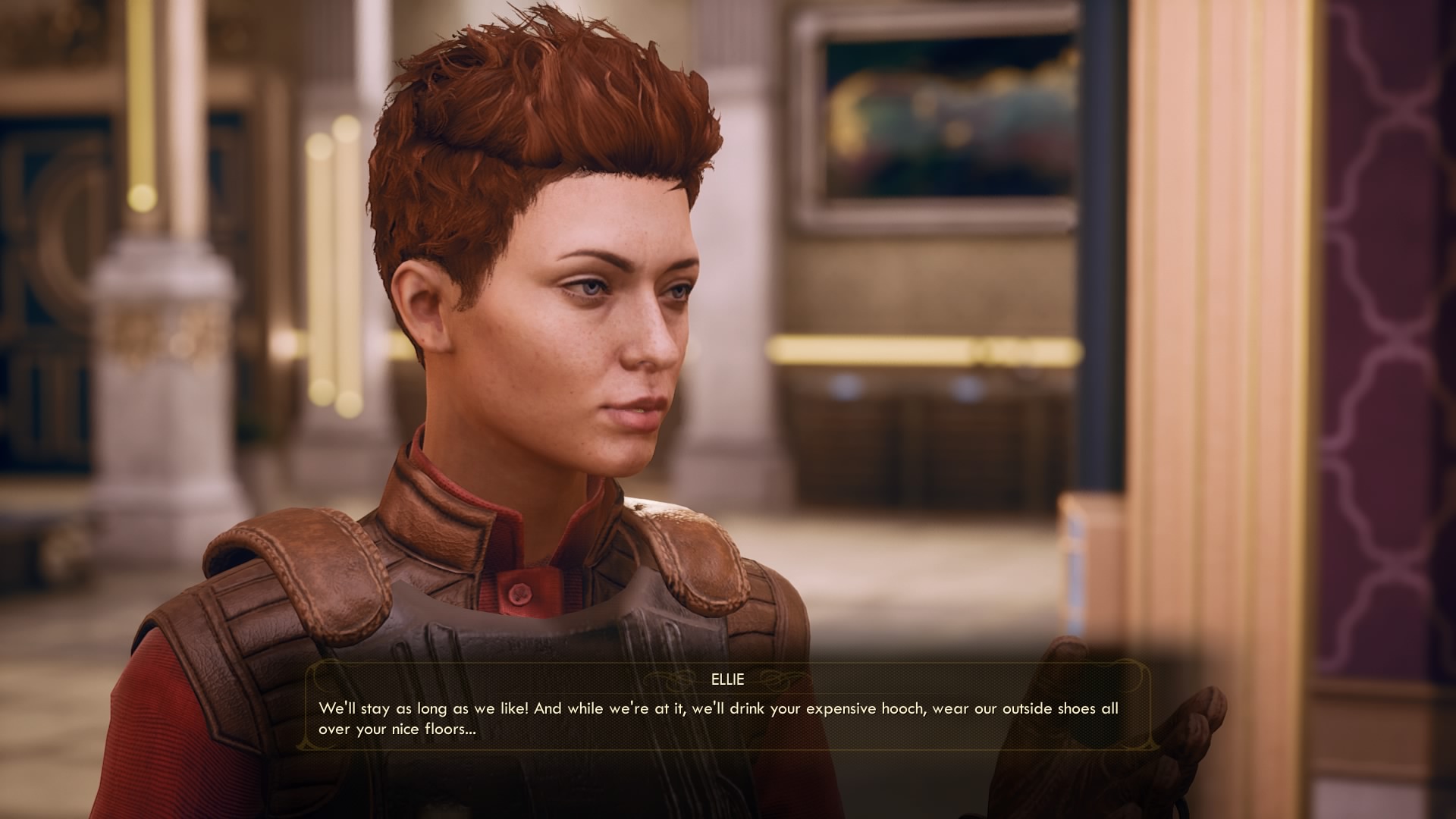
If the ethos of The Outer Worlds’ skill system is to give you unlimited ways to solve the same problem, the ethos of its narrative is to give you unlimited paths to the same destination. In theory, you’re determining the course of the Halcyon colony, siding with the outlaw scientist Phineas Welles to awaken the inhabitants of the lost Hope or handing him over to the ruthless Board and helping them make the colony into the Ayn Rand theme park of their dreams. Along the way, you can side with different factions to chart the fates of Halcyon’s various settlements, but in practice, those choices don’t add up to much more than a blurb in the end-of-game wrap-up. Yes, you can decide who’s in charge of a handful of towns or just slaughter everyone in the colony, but you’ll still end up playing the same main missions and following the same general path. There is an impressive degree of flexibility to how the game adapts to your choices, letting you switch sides over and over with the relevant faction quests just getting slotted into place, but that’s enabled by a thin illusion of choice covering a very rigid narrative structure. Whether you broker peace in any given town or consign it to ruin, the story keeps chugging along, shuttling you onto the next location without so much as a look back at the planet whose fate you’ve just single handedly decided. You can often just kill your quest givers and take whatever you were hoping to gain from them without any real consequences except the ire of a faction you’ll never need to deal with again.
It’s the colony that matters in The Outer Worlds, not the people in it, and that basically dooms its attempts at corporate satire from the start. The Board sees individual workers as drones that it is absolutely willing to kill to help the 1% live a little better for a little longer, but even the “heroic” ending doesn’t imbue them with any humanity, still considering Hope’s inhabitants valuable only by virtue of how they might help the colony survive. Your quest to awaken the colonists stuck in suspended animation on the Hope isn’t motivated by wanting to help them; it’s because the Hope is evidently some kind of honor student ark filled with Earth’s “best and brightest” who can put the failing colony back on track.
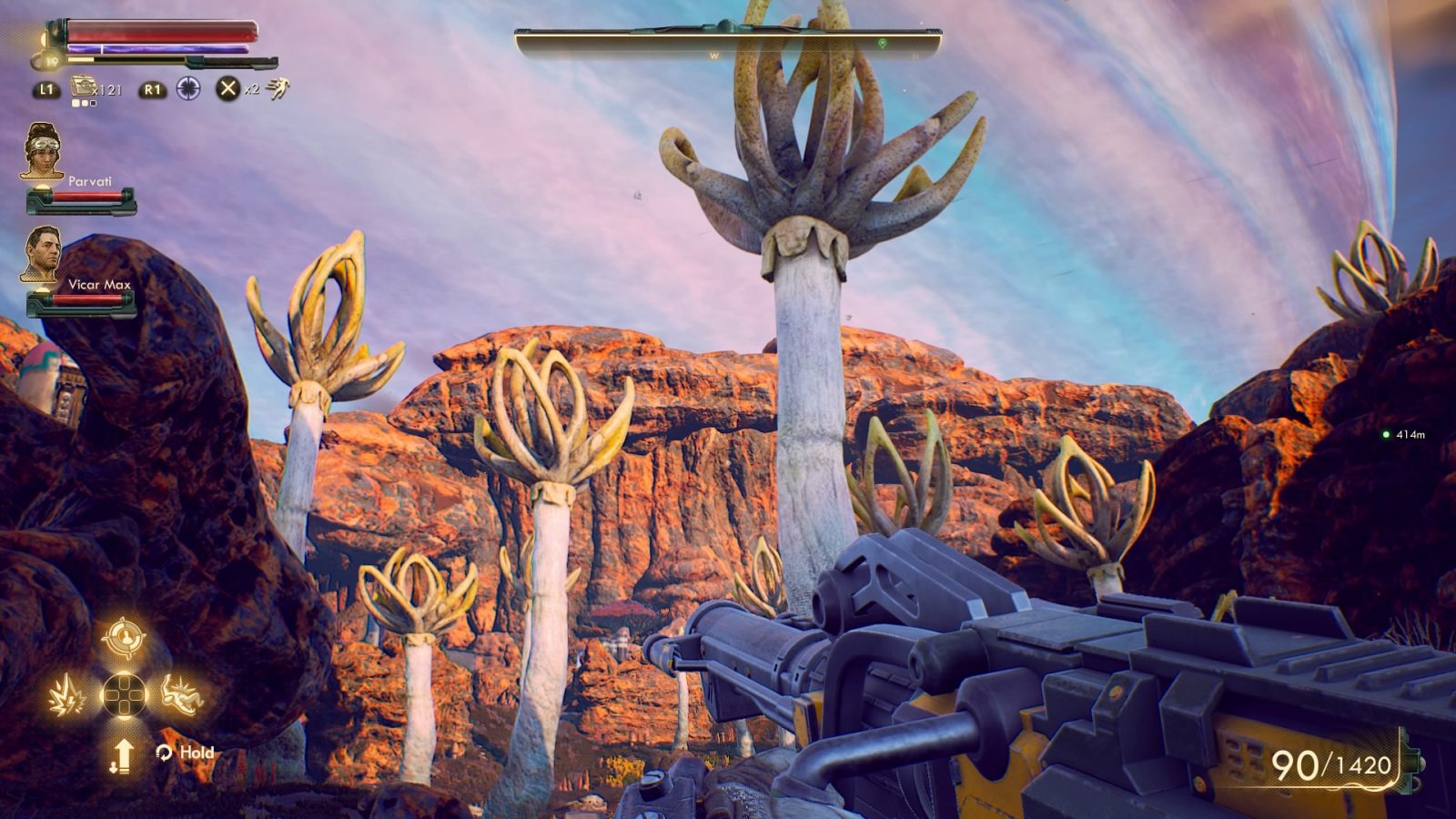
The shaky premise that underpins The Outer Worlds sits on top of an uneven satire, which posits a space colony run by amoral corporations for the exclusive benefit of the rich without really having anything to say about it. Colonists are pressed into indentured servitude, devoting their lives to a corporation in exchange for the relative safety of living inside a walled city modeled after a 19th-century company town run with practically no oversight. The Outer Worlds’ attempts at satire build on that framework, drawing on some very real issues but treating them like punchlines in and of themselves. References to worker exploitation (up to and including workers being killed or dismembered), companies getting entire communities sick, and even parallels to corporate-backed paramilitary groups like the Pinkertons are used either as jokes or evidence of the evil of the game’s corporations, but The Outer Worlds refuses to examine any of it further, content to just display this depravity without further comment. If you choose to side with the Board, things get even darker, but the game seems to actually tone down its jabs when you take this path, painting the perpetrators of atrocities as somehow being forced into it — almost as if you’re expected to find them reasonable, if still unsympathetic. (This company only gives workers 10 minutes of break time for their birthdays; isn’t that funny? Anyway, go slaughter an entire town to save the Board on energy costs. Don’t worry; you’ll never have to interrogate that decision later.)
As you would expect, plenty of people object to the Board’s rule, but The Outer Worlds pushes them to the margins almost as much as the corporations themselves do. Aside from universally aggressive marauders, the only real resistance to the corporations is limited to one isolated band of deserters and a quasi-religious group of revolutionaries living in the wilderness. Ever careful to avoid taking sides, The Outer Worlds goes out of its way to make the leaders of these groups seem dangerous, selfish, or hypocritical, and siding with them generally leads to worse outcomes than collaborating with the corporations. It all adds up to the bizarrely conservative notion that, while these corporations would literally kill to make a profit, they do provide stability, so who’s to say whether we’d really be better off without them? This strange ambivalence, the desire to paint those who oppose the game’s cartoonishly evil corporations as somehow suspect, shows up all over the place in The Outer Worlds. For instance, your most reasonable companions tend to be the most protective of the status quo, while the most radical is also kind of a starry-eyed airhead. One of the most telling details for me is the simple fact that corporate NPCs get names like “guard” and “worker,” while members of the anti-corporate Iconoclasts are called things like “rioter,” even if they’re doing nothing more than standing around a bar or doing clerical work.
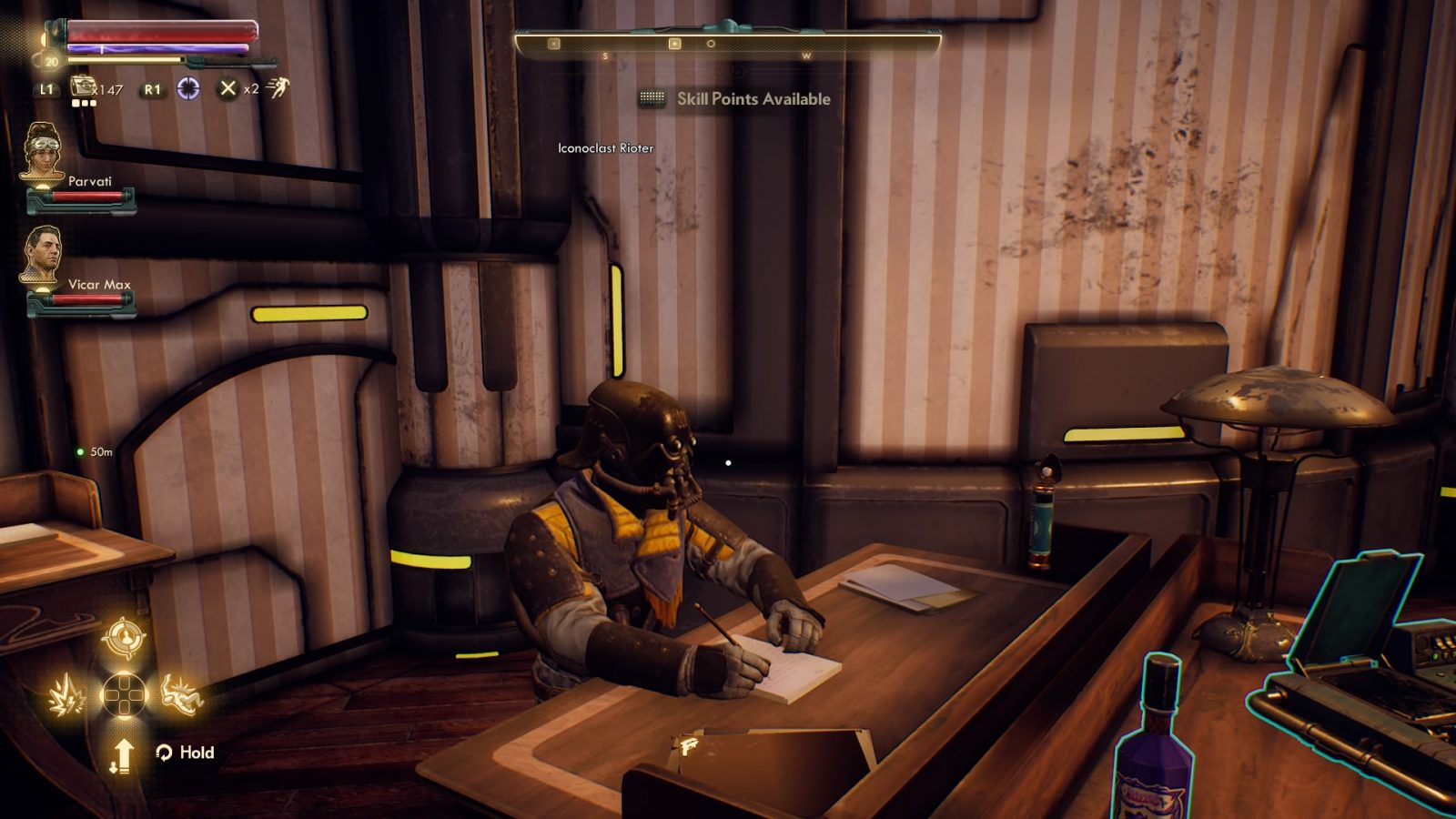
The Outer Worlds is so uninterested in commenting on its setting, it makes me wonder why it was chosen at all. Rather than say anything about unchecked corporatism, The Outer Worlds just portrays its excesses, seemingly hoping that players will draw their own conclusions even when it’s unwilling to do the same. Despite its confused, noncommittal story, The Outer Worlds features some great writing and memorable if underused characters. If you’re able to look past its ultimate shallowness and don’t demand much more from the game’s combat than what you’d get from a first-person Fallout game, The Outer Worlds may still satisfy your open-world RPG craving.





















